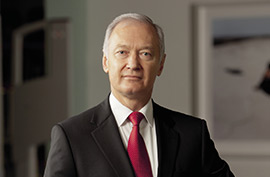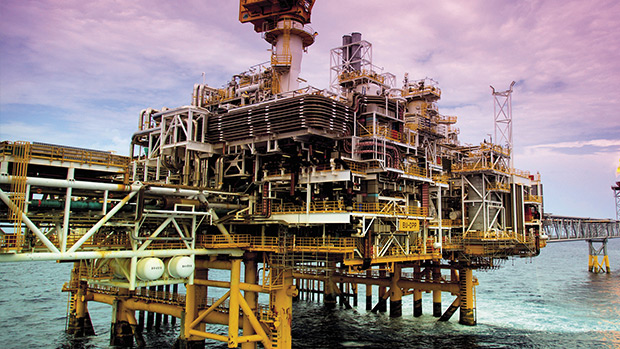The international operations of Murray & Roberts have shone in a challenging year, reinforcing the wisdom of the Group’s increasing exposure to growth markets beyond South Africa.
in earnings to strong performances by its Australian subsidiary Clough and mining operations outside South Africa. The South African operations were
able to staunch losses associated with the cost of relentless industrial action at major project sites and the sustained economic downturn but were only marginally profitable during the period under review.
“These results are consistent with our expectations and they demonstrate the effectiveness of our strategy to focus on our core assets and strengthen our exposure to growing international markets,” Laas commented.
“They are also a strong reflection of the determination of our people to return
Murray & Roberts to good health and position it for a new strategic future.”
In a recent move to strengthen its longterm growth plans, the Group announced its intention to acquire all of the remaining ordinary shares in Clough (it currently holds 61,6%).
Murray & Roberts embarked on a strategy in 2011 to restore financial stability after mounting losses on major projects threatened the Group’s future sustainability. Now entering its third year, the Recovery and Growth strategy has achieved all of its milestones to date, restoring financial liquidity and stability, resolving a number of potentially material impact items, including major project claims, and positioning the Group for the Clough’s Bayu-Undan Offshore Facility, Timor Sea next phase of growth.
Disposal of non-core assets
The past financial year has seen the disposal of noncore manufacturing assets, including the Steel group, Union Carriage & Wagon and all of the businesses in the Construction Products Africa platform with the exception of Hall Longmore, the sale of which is expected to be concluded in the current financial year. Proceeds of approximately R1,3 billion from these disposals have enabled Murray & Roberts to reduce debt in its heavily geared South African balance sheet, contributing to a healthy net cash position of R4,6 billion at 30 June 2013 and providing Murray & Roberts with the means to pursue international investments that offer the best potential for long-term growth.
Murray & Roberts’ vision for 2020 is to be the leading diversified engineering and construction group in the global underground mining market and selected emerging markets in the natural resources and
infrastructure sectors. The disposal of the Construction Products Africa platform has strengthened the Group’s focus on its four remaining operational platforms which operate in regional (African) or international markets.
Regional and international positioning
The regionally focused platforms are Construction Africa and Middle East,
and Engineering Africa, although there is also opportunity on the continent for
the other two platforms. With a strategy to target private sector projects in the
metals & minerals, energy and water sectors, Murray & Roberts has identified three regions and is well advanced in the development of hubs to serve them. The Engineering Africa platform has already established a presence in Accra in Ghana to serve west Africa and the Construction Global Underground Mining platform recently opened an office in Kitwe, Zambia to serve central Africa. New projects have been secured as a result of the increased focus on these regions. (Turn to page 10 for more information).
The more significant contributors to future growth will be the two internationally focused platforms, Construction Global Underground Mining
and Construction Australasia Oil & Gas and Minerals. These platforms have
capitalised on the recent unprecedented growth in infrastructure investment
programmes in their targeted market sectors in Australia and Southeast Asia, and they are where the Group will deploy available growth capital in future.
Murray & Roberts’ vision for 2020 is to be the
leading diversified engineering and construction group in the global underground mining market and selected emerging markets in the natural resources and infrastructure sectors.
WE ARE SORRY

An excerpt from an open letter by Henry Laas in the Sunday Times on 21 July 2013:
" Murray & Roberts is a household name in South Africa. We have played a significant role in developing the country’s infrastructure for more than 110 years and we are fiercely proud of our heritage.
I know that the Competition Commission’s findings of collusion in the construction sector have angered and disappointed you, just as they have our board, executives, employees, shareholders and other stakeholders.
And for that, on behalf of Murray & Roberts, I have one fundamental response. An unequivocal apology.
Our internal review covered more than 2 500 project tenders submitted by our company over a ten year period (2001 to 2011). The 17 cases of collusive behaviour happened between 2004 and 2007 and largely within the two companies that were acquired by Murray & Roberts in 2006 and 2007. About half of these 17 collusive practices happened before the acquisition dates and the balance largely within the first year after we acquired these companies.
Although we cannot change our past, we can change our future. Murray & Roberts is a company with a strong value system and it requires ethical business conduct from all its employees. Today I give you a commitment that for as long as I am at the helm of Murray & Roberts, I will ensure that systems and processes are in place that are aimed at preventing anything of this nature happening again. We have a lot to offer South Africa and we will work hard to restore trust in our sector with all our stakeholders.
We know that through our participation in South Africa’s infrastructure development we have the potential to make a great impact on some of the country’s biggest challenges; job creation, skills and enterprise development and of course driving growth
through the development of infrastructure."



